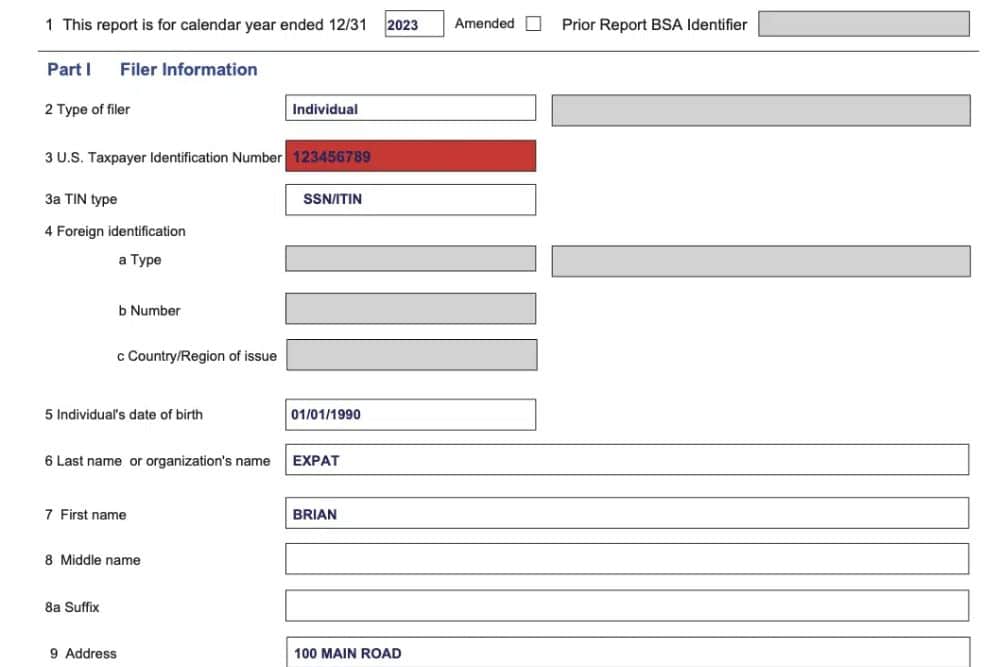FBAR Penalties in 2025: What Expats Need To Know

Many Americans living overseas are required to file a Foreign Bank Account Report (FBAR). However, not everyone is aware of this, leading to unintentional violations.
Worried about FBAR penalties? Greenback Expat Tax Services has you covered. Our team of seasoned tax professionals specializes in helping expats like you navigate the complexities of FBAR requirements. Many of us are expats ourselves, so we know how daunting it can be to stay compliant with ever-changing regulations, especially when it comes to reporting foreign bank accounts. With Greenback, you’ll benefit from our extensive experience in expat tax matters and our commitment to providing clear, accurate advice.
Here’s an overview of the topic to help you avoid any FBAR penalties.
Key Takeaways
- The FBAR is an annual report that US citizens, residents, and certain other persons must file with the US Treasury Department if they have a financial interest in, or signature authority over, a financial account in a foreign country with an aggregate value of more than $10,000 at any time during the calendar year.
- Failing to file an FBAR when required can result in severe penalties.
- If you have failed to file FBARs when required, the IRS offers an amnesty program, if you qualify, to help taxpayers catch up without paying any fines.
What Is the FBAR?
The Foreign Bank Account Report, or FBAR, is a form used to report foreign financial accounts outside the US. Its purpose is to prevent Americans from engaging in tax evasion by hiding their wealth overseas.
Under the Bank Secrecy Act, the FBAR form must be filed annually with the US Treasury Department using the BSA E-Filing System if a US person has a financial interest in, or signature authority over, foreign financial accounts with an aggregate value of more than $10,000 at any time during the calendar year.
To remain compliant, Green Card holders and other US persons must adhere to these FBAR filing requirements. The FBAR due date is April 15, 2025, with an automatic extension available until October 15, 2025.
Want to learn more? Here’s a more detailed FBAR Overview.
The FBAR is a purely informational tax form, but it’s crucial for maintaining compliance with US tax laws. Taxpayers lose nothing by filing when required—it doesn’t create a tax liability— but they could face stiff penalties if they fail to meet FBAR filing requirements.
What Is the Penalty for Failing To File an FBAR?
IRS tax examiners are vigilant about FBAR non-compliance, and the penalties for failing to report foreign financial accounts can be severe. The US Financial Crimes Enforcement Network (FinCEN) regulates the FBAR form (officially known as the FinCEN Form 114: Report of Foreign Bank and Financial Accounts).
While FinCEN regulates the FBAR, the IRS has the delegated authority to enforce civil monetary penalties and criminal penalties for FBAR violations. FBAR penalties vary, depending on whether the failure to file was willful or non-willful. Since monetary fines are adjusted annually for inflation, when the violation occurred also matters.
FBAR Penalties for Willful Failure To File
Willful failure to file means that a person knew, or reasonably should have known, that they were required to file an FBAR and chose not to.
The standard penalty for willful failure to file is $100,000 or 50% of the account’s maximum value at the time of the violation, whichever is higher, for each year a person didn’t file a required FBAR.
In some cases, willful non-compliance results in criminal penalties, including a prison sentence.
FBAR Penalties for Non-Willful Failure To File
A non-willful violation is when a person didn’t know, or reasonably couldn’t be expected to know, that they were required to file an FBAR form.
The standard non-willful penalty for failure to file can be up to $10,000 per form for each year a person didn’t file a required FBAR. This penalty amount can be higher, depending on the year’s inflation adjustment.
Recent court rulings, including the Supreme Court decision in the Bittner case, have clarified that the IRS is taking a per-form approach to FBAR penalties. This means the IRS imposes penalties for each form that wasn’t filed, not for each foreign financial account.
If you have failed to file FBARs, you may qualify for an IRS amnesty program, which can help you catch up without paying any fines.
Can the IRS Find People Who Haven’t Filed the FBAR?
Yes, the IRS can find individuals who haven’t filed the FBAR. The Foreign Account Tax Compliance Act (FATCA) mandates that foreign financial institutions report the balance of any accounts held by US citizens to the IRS.
Although the US government can’t force foreign countries to comply with US law, numerous formal agreements exist in which foreign governments and financial institutions agree to comply.
This means that the IRS generally knows who should file an FBAR, and by cross-referencing that information with FBAR filing data, they can identify who has failed to file an FBAR, whether willfully or non-willfully.
When you live in the US, tax day is simple: April 15th! When you move abroad, it’s not so straightforward! Learn about all the expat deadlines and extensions you need to know to file.

What Should I Do If I Didn’t File My FBAR Report?
If you haven’t filed an FBAR when required, don’t panic. The penalties listed above are primarily aimed at US citizens who are “caught” failing to file and were contacted by the IRS first. If you’re an American living abroad and haven’t been contacted yet, you may not be subject to any FBAR penalties.
The IRS provides two voluntary disclosure programs for US persons who need to file delinquent FBARs or late taxes:
- The Streamlined Compliance Procedures
- The Delinquent FBAR Submission Procedures
Both tax amnesty programs let non-willful expat violators catch up on their filing obligations—including for the FBAR—without facing any penalties.
The Streamlined Compliance Procedures are designed for US expats who have been delinquent in filing their annual income taxes and possibly also their required FBARs. If you qualify for the Streamlined Compliance Procedures, all you have to do is:
- Self-certify that your failure to file was not willful.
- File the last three delinquent income tax returns and pay any delinquent taxes you owed during that time (with interest).
- File FBARs for the last six tax years.
However, if you have been filing and paying your annual income taxes, you can use the Delinquent FBAR Submissions Procedures. To do this, you have to:
- Self-certify that your failure to file was not willful.
- File all delinquent FBARs.
In most cases, this should be sufficient to bring you into compliance with IRS standards.
Even if the IRS doesn’t approve you for these amnesty programs, you may still be able to prove “reasonable cause” for your failure to file. If you do, the IRS will likely reduce or eliminate any penalties against you.
The Role of a CPA and Tax Professional
Navigating the complexities of US expat taxes and FBAR filing requirements can be challenging. Consulting with a CPA or a tax professional specializing in international tax can provide valuable guidance. They can help ensure you meet all reporting requirements and avoid costly penalties. The FBAR form is due on April 15th each year (with an automatic extension to October 15th), so remember to seek help before these due dates.
Have Questions about FBAR penalties? We’re here to help!
We hope this post has given you a better understanding of how FBAR penalties can impact US expats living abroad. Contact us, and one of our customer champions will gladly help answer your questions. If you need specific advice on your tax situation, click below to get a consultation with one of our expat tax experts.



